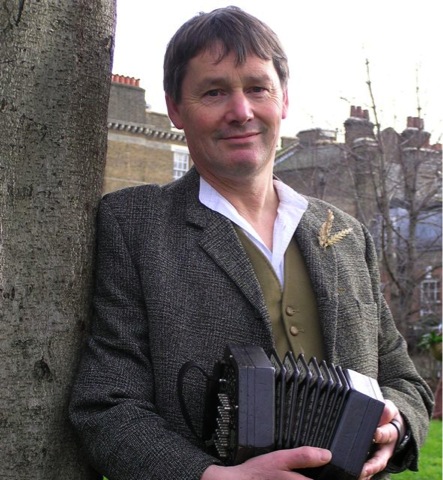Tim Laycock
 Tim Laycock draws his musical inspiration from the traditional music and poetry of Dorset.
Tim Laycock draws his musical inspiration from the traditional music and poetry of Dorset.
Tim grew up in Fontmell Magna in the Blackmore Vale, where he first heard the dialect poetry of William Barnes and has a lifelong interest in the folklore, traditions, music and stories of Dorset
He began recording in 1978 when he produced Lylinch Bells, the first commercial recording of Dorset dialect poetry, read by Tim Laycock, David Strawbridge, Ethel Gumbleton, Charlie Andrews and Frank Hilliar. It is still available on CD as The Year Clock.
Tim has performed for 40 years as a folk singer, actor, songwriter and storyteller.
The Ridgeway Singers & Band came together as part of the South Dorset Ridgeway Landscape Partnership, supported by the Heritage Lottery Fund, to revive West Gallery music, the traditional harmony songs performed in church galleries in the 18th and 19th centuries. Wiiliam Barnes, Dorset's celebrated pastoral poet, wrote many poems in the local dialect reflecting rural life in the 19th century. Here Tim Laycock recites, and Phil Humphries plays, the Humstrum.
An excerpt from "Free to Goo Abrode", written, directed and shot by John Holman and broadcast on TSW in 1991. It was a programme about the life and work of Dorset poet William Barnes (1801-1886), perhaps best known for Linden Lea and I'm prepared to bet was the only time that a whole half hour of broadcast television was entirely in the dialect of the Blackmoor Vale! The charm of his poems and the unfamiliar (to most of us anyway) dialect can obscure the technical mastery of some of his work. The Waggon a-Stooded is an eclogue, a form of pastoral poem which often consists of a conversation between the characters and was first developed by Virgil in 37bc. "George" is played by Tim Laycock, "William", Richard Turner, "Jeames", David Fox and "the bwoy", Gabriel Laycock. Some of the edits are a little bumpy as it appeared in four chunks in the orginal programme and proved a bit tricky to extract. If you have a favourite poem relevant to the Transition Vision area give us a shout and we will see if we can get it onto the site in some form. Or if you are a poet working in this area or writing about this area seeking an audience, please get in touch. For more like this visit www.transitionvision.tv.


